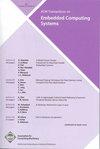IOSR: Improving I/O Efficiency for Memory Swapping on Mobile Devices Via Scheduling and Reshaping
IF 2.6
3区 计算机科学
Q2 COMPUTER SCIENCE, HARDWARE & ARCHITECTURE
引用次数: 0
Abstract
Mobile systems and applications are becoming increasingly feature-rich and powerful, which constantly suffer from memory pressure, especially for devices equipped with limited DRAM. Swapping inactive DRAM pages to the storage device is a promising solution to extend the physical memory. However, existing mobile devices usually adopt flash memory as the storage device, where swapping DRAM pages to flash memory may introduce significant performance overhead. In this paper, we first conduct an in-depth analysis of the I/O characteristics of the flash-based memory swapping, including the I/O interference and swap I/O randomness in swap subsystem. Then an I/O efficiency optimization framework for memory swapping (IOSR) is proposed to enhance the performance of flash-based memory swapping for mobile devices. IOSR consists of two methods: swap I/O scheduling (SIOS) and swap I/O pattern reshaping (SIOR). SIOS is designed to schedule the swap I/O to reduce interference with other processes I/Os. SIOR is designed to reshape the swap I/O pattern with process-oriented swap slot allocation and adaptive granularity swap read-ahead. IOSR is implemented on Google Pixel 4. Experimental results show that IOSR reduces the application switching time by 31.7% and improves the swap-in bandwidth by 35.5% on average compared to the state-of-the-art.IOSR:通过调度和重塑来提高移动设备上内存交换的I/O效率
移动系统和应用程序的功能越来越丰富和强大,它们不断受到内存压力的影响,特别是对于配备有限DRAM的设备。将非活动DRAM页交换到存储设备是一种很有前途的扩展物理内存的解决方案。然而,现有的移动设备通常采用闪存作为存储设备,将DRAM页面交换到闪存可能会带来很大的性能开销。本文首先深入分析了基于闪存交换的I/O特性,包括交换子系统中的I/O干扰和交换I/O随机性。为了提高移动设备上基于闪存的内存交换性能,提出了一个内存交换I/O效率优化框架(IOSR)。IOSR包括两种方法:交换I/O调度(SIOS)和交换I/O模式重塑(SIOR)。SIOS设计用于调度交换I/O,以减少与其他进程I/O的干扰。SIOR旨在通过面向进程的交换槽分配和自适应粒度交换预读来重塑交换I/O模式。IOSR在Google Pixel 4上实现。实验结果表明,与现有技术相比,IOSR平均减少了31.7%的应用切换时间,提高了35.5%的换入带宽。
本文章由计算机程序翻译,如有差异,请以英文原文为准。
求助全文
约1分钟内获得全文
求助全文
来源期刊

ACM Transactions on Embedded Computing Systems
工程技术-计算机:软件工程
CiteScore
3.70
自引率
0.00%
发文量
138
审稿时长
6 months
期刊介绍:
The design of embedded computing systems, both the software and hardware, increasingly relies on sophisticated algorithms, analytical models, and methodologies. ACM Transactions on Embedded Computing Systems (TECS) aims to present the leading work relating to the analysis, design, behavior, and experience with embedded computing systems.
 求助内容:
求助内容: 应助结果提醒方式:
应助结果提醒方式:


